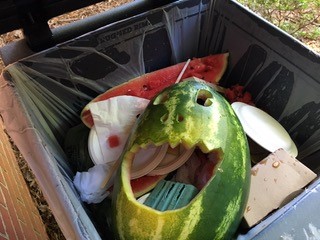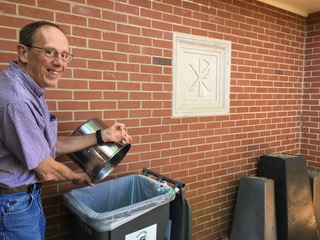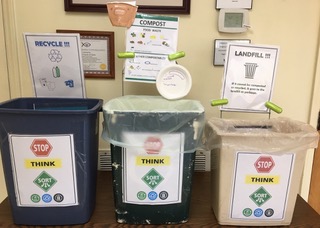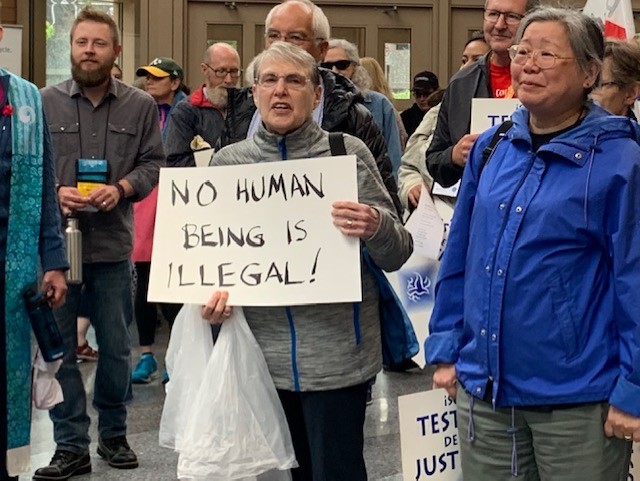Love of creation evident in North Carolina church’s compost pile
 This year for Earth Day, the members of Community United Church of Christ (CUCC) in Raleigh, North Carolina, aren’t doing anything out of the ordinary, even though they are committed as a congregation to love of creation through a number of efforts that reduce the impact of climate change.
This year for Earth Day, the members of Community United Church of Christ (CUCC) in Raleigh, North Carolina, aren’t doing anything out of the ordinary, even though they are committed as a congregation to love of creation through a number of efforts that reduce the impact of climate change.
“We don’t have plans for Earth Day, because Earth Day is every day here,” said Gary Smith, a retired scientist and leader of CUCC’s Justice in a Changing Climate (JCC) ministry team.
Smith started researching the environmental effects of a changing climate in 2007 and noted that the impact was worse on people with fewer resources. So one of the JCC team’s first projects involved helping low income families weatherize their homes.
“There is a federal program that will weatherize homes for free for low income residents,” Smith said. “But they need to have room in which to work.” So the church group cleans out attics and crawl spaces to ready those homes for insulation. To date, they have completed 30 houses in the community.
The JCC team also spearheaded the process to put solar panels on the roof of the fellowship hall in 2015. A fundraiser not only covered the cost for Community UCC’s 9.2 kilowatt solar array, it collected enough money to help put solar arrays on the roofs of four other churches or non-profits in the area. CUCC’s solar panels now supply half of the electricity for the church main building and keep about 14,000 pounds of CO2 from the atmosphere every year.
 “We are motivated by the need to pull carbon out of the atmosphere,” Smith said. “We can do that by growing trees or composting food materials. Through composting, the carbon stays in the soil.”
“We are motivated by the need to pull carbon out of the atmosphere,” Smith said. “We can do that by growing trees or composting food materials. Through composting, the carbon stays in the soil.”
Community UCC’s latest effort started last July, inspired by friends at the neighboring Church of the Nativity Episcopal Church who have long advocated carbon sequestration and composting. The JCC team started collecting food waste from the fellowship hall. They also encouraged friends and members of CUCC to bring their compostable waste (including meat, bones and pizza boxes) to church to be composted, too. Families got involved and the number of composters has continued to grow.
By March, Smith said, CUCC had diverted 2400 pounds of organic matter (over a ton) from the landfill, which created almost 600 pounds of compost.
Then the compost company the church was working with increased their haul-away charge by 400%, so the JCC team went to work.
“We thought it was an opportunity,” said Maria Mayorga, another JCC member. “If people could sign up to bring their compost waste from home, it would not only raise funds but increase participation, a win-win! The more people participate, the more ‘normal’ becomes until it will hopefully one day be the norm.”
 Unclear if their plans for a direct appeal could raise an additional $100 month to sustain CUCC’s composting program, the Justice in a Changing Climate team held two weekends of educational events in March to teach the congregation about composting, its value and why they needed more money to continue the program through the year.
Unclear if their plans for a direct appeal could raise an additional $100 month to sustain CUCC’s composting program, the Justice in a Changing Climate team held two weekends of educational events in March to teach the congregation about composting, its value and why they needed more money to continue the program through the year.
“It was amazing,” Smith said. “Once they heard that, people just wanted to contribute. We raised half the money we needed for the year right there during worship that first day. We had a table set up after worship and by the end of day we had 80%. By the second week, we raised it all.”
One of the things that got people’s attention — a simple calculation which illustrates how their composting is making a huge difference.
“A key benefit of composting is it prevents the production of the methane (a very strong greenhouse gas) that is made in landfills,” Smith said. “We were surprised and elated when we realized that because of this, our new composting effort is comparable to our solar panels in prevention of climate change – 7,000 pounds of CO2 equivalents avoided in eight months vs. 14,000 pounds in 12 months! We were dumbfounded by the impact.”
“It has been remarkable to engage in this ministry and to practice our courageous faith together,” said the Rev. Jenny Shultz-Thomas, CUCC pastor. “When we first launched the composting program, we were hopeful that it would be sustainable and that members of the congregation would be supportive and that ‘some’ would participate. The response was overwhelming. The program is now entirely funded by individual members who sign-up as monthly sponsors with an option to support more than one month at a time.”
“You’ve heard the metaphor that it takes snowflakes to make a storm, I think these little steps are the least we can do to combat global warming,” Mayorga said. “It is also the Christian thing to do, to take care of creation and to love our neighbor and our future generations.
“It seems daunting but it really is not that much work, it’s just different,” she continued. “I hope other churches can duplicate this or find what works for them to be active in creation care.”
“Not only are we able to imagine that combating climate change is possible, but we are also able to measure the impact of a hopeful people who are committed to leading the way in courageous faith through Love of Creation, Love of Neighbor and Love of Children,” said Schultz-Thomas. “Spirit is leading the way.”
 This story, highlighting the ministry of a local church, is part of the UCC’s 3 Great Loves campaign, seeking to build a just world for all as one united church. Visit 3GreatLoves.org to learn how we’re showing Love of Children, Love of Neighbor, and Love of Creation.
This story, highlighting the ministry of a local church, is part of the UCC’s 3 Great Loves campaign, seeking to build a just world for all as one united church. Visit 3GreatLoves.org to learn how we’re showing Love of Children, Love of Neighbor, and Love of Creation.Related News
AM21 gathering in Arizona draws many to the work of ‘unraveling for repair’
Every two years, the Ministerial Excellence, Support and Authorization (MESA) ministry team of...
Read MoreHymnwriter Ruth C. Duck remembered for her trailblazing use of inclusive language
In her 1993 hymn, “Come and Seek the Ways of Wisdom,” the Rev. Dr. Ruth C. Duck...
Read MoreWebinar: Legal considerations for faith communities with questions about sanctuary for the new year
The new year means new laws and regulations for faith communities serving asylum seekers....
Read More


